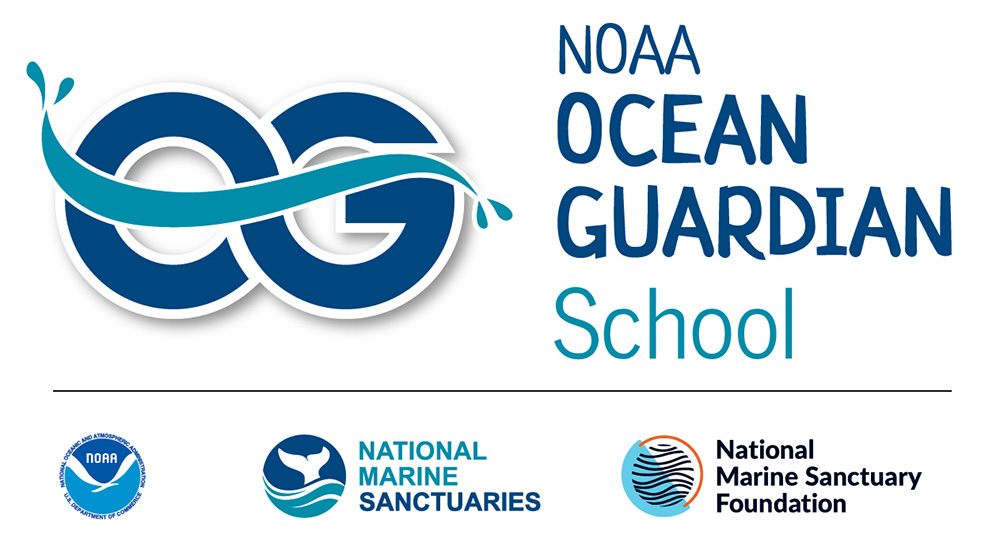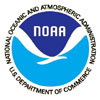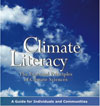Ocean Guardian School Resources

This page lists a variety of resources with all kinds of information to help enrich, inspire and support your Ocean Guardian School Project. Some of the resources serve a specific area; however, you may find those links to be useful in another watershed. This is by no means an exhaustive list. We will be updating it along the way.
General Environmental/Marine Education
 NOAA’s OFFICE OF NATIONAL MARINE SANCTUARIES
NOAA’s OFFICE OF NATIONAL MARINE SANCTUARIES
NOAA’s Office of National Marine Sanctuaries offers numerous educational resources and programs for both teachers and students.
 WOODS HOLE OCEANOGRAPHIC INSTITUTE
WOODS HOLE OCEANOGRAPHIC INSTITUTE
The Woods Hole Oceanographic Institution is dedicated to research and education to advance understanding of the ocean and its interaction with the Earth system, and to communicating this understanding for the benefit of society.
 OCEAN TODAY
OCEAN TODAY
Ocean Today is an exciting, multimedia kiosk that features videos on all aspects of the ocean realm, exploration and discoveries, marine life and science.
 NOAA’s NATIONAL OCEAN SERVICE
NOAA’s NATIONAL OCEAN SERVICE
NOAA’s National Ocean Service provides online resources and programs for educators, students, and anyone who wants to learn more about our ocean and coasts.
 OCEAN LITERACY PRINCIPLES
OCEAN LITERACY PRINCIPLES
This interagency-developed document offers the essential principles and fundamental concepts of ocean science for learners of all ages. It further provides the tools for ocean-literate individuals to be able to make informed and responsible decisions regarding the ocean and its resources and communicate about the ocean in a meaningful way.
Marine Debris/Plastic Pollution
 NOAA MARINE DEBRIS PROGRAM
NOAA MARINE DEBRIS PROGRAM
A richly informative website dedicated to NOAA's efforts in addressing the national and international issue of marine debris.
 SURFRIDER FOUNDATION
SURFRIDER FOUNDATION
Surfrider Foundation has developed many resources, programs and initiatives that are dedicated to their primary mission of preserving the world's oceans, waves and beaches.
 PLASTIC POLLUTION COALITION
PLASTIC POLLUTION COALITION
This international alliance of individuals, businesses and organizations is working together to stop plastic pollution in our environment. Learn how they are making a difference and how you can help.
 ALGALITA MARINE RESEARCH FOUNDATION
ALGALITA MARINE RESEARCH FOUNDATION
The Algalita Marine Research Foundation is one of the leading research organizations of marine plastic pollution. They offer a variety of educational resources and materials for use in the classroom.
 OIKONOS
OIKONOS
This non-profit organization focuses its research and educational programs on increasing awareness and understanding of human impacts on marine ecosystems.
 THE 5 GYRES INSTITUTE
THE 5 GYRES INSTITUTE
The 5 Gyres Institute aims to educate the public on the dangers of plastics polluting our oceans. They implement local, national, and international projects with the goal of creating a world with plastic-free oceans.
 BOW SEAT OCEAN AWARENESS PROGRAMS
BOW SEAT OCEAN AWARENESS PROGRAMS
Bow Seat provides an innovative space for teens to connect, create, and communicate for the ocean. Working at the intersection of ocean science and arts education, the programming emphasizes creative thinking and making in exploring the natural world.
 WASHED ASHORE
WASHED ASHORE
Washed Ashore, a foundational project of Artula Institute for Arts and Education, works to build and exhibit aesthetically powerful art to educate a global audience about plastic pollution in the ocean and waterways and to spark positive changes in consumer habits.
Rethink/Refuse/Reduce/Reuse/Rot/Recycle
 STOP WASTE.ORG
STOP WASTE.ORG
This Alameda County integrated public agency is a collaboration between the Alameda Waste Management Authority and the Alameda County Source Reduction and Recycling Board. The agency offers resources, programs and support to schools in Alameda County to promote recycling and other waste reduction strategies.
 A TRASH FREE LUNCH EXPERIMENT: MEASURING "BEFORE" AND "AFTER"
A TRASH FREE LUNCH EXPERIMENT: MEASURING "BEFORE" AND "AFTER"
Learn how students from Taylor Elementary School in Arlington, Virginia participated in a school-wide experiment to reduce their own lunch waste.
 WORLD WILDLIFE FUND: BE A FOOD WASTE WARRIOR
WORLD WILDLIFE FUND: BE A FOOD WASTE WARRIOR
K-12 lessons, activities, and resources to teach the planetary impact of what we eat and what we throw away.
 ENVIRONMENTAL PROTECTION AGENCY: THE QUEST FOR LESS
ENVIRONMENTAL PROTECTION AGENCY: THE QUEST FOR LESS
The Quest for Less provides hands-on lessons and activities, enrichment ideas, journal writing assignments, and other educational tools for K-8 students related to preventing and reusing waste.
Energy & Ocean Health
 NOAA Climate.gov: Science and information for a climate-smart nation
NOAA Climate.gov: Science and information for a climate-smart nation
NOAA Climate.gov is a source of timely and authoritative scientific data and information about climate. "Teaching Climate" is one of the four sections which contains numerous reviewed resources for teaching about climate and energy.
 CLIMATE LITERACY: The Essential Principals of Climate Science
CLIMATE LITERACY: The Essential Principals of Climate Science
This interagency guide provides a framework and essential principles for formal and informal education about climate change. It presents important information for individuals and communities to understand Earth's climate, impacts of climate change, and approaches for adapting and mitigating change. Principles in the guide can serve as discussion starters or launching points for scientific inquiry. The guide can also serve educators who teach climate science as part of their science curricula.
 CLEAN: CLIMATE LITERACY & ENERGY AWARENESS NETWORK
CLEAN: CLIMATE LITERACY & ENERGY AWARENESS NETWORK
A collection of climate and energy educational resources that have been rigorously reviewed by educators and scientists
 VIRTUAL URCHIN
VIRTUAL URCHIN
An international team of scientists and educators have developed an online high school biology project in which students use virtual labs to understand how scientists study sea urchins to understand larval development and metamorphosis, community ecology, pollution in the marine environment and biological evolution
 INQUIRY TO STUDENT ENVIRONMENTAL ACTION(I2SEA)
INQUIRY TO STUDENT ENVIRONMENTAL ACTION(I2SEA)
2SEA is a collaboration between The Sven Loven Centre for Marine Sciences at the University of Sweden, the Hopkins Marine Station of Stanford University, and Friday Harbor Labs of the University of Washington. This project offers curricular tools on challenging environmental topics such ocean acidification and climate change with the goal of empowering high school and secondary school students in how to address these worldwide issues.
 CLIMATE CHANGE LIVE
CLIMATE CHANGE LIVE
The U.S. Forest Service and 26 federal and NGO partners bring climate learning to the classroom through a series of webcasts, webinars, and online climate education resources.
 ALLIANCE FOR CLIMATE EDUCATION (ACE)
ALLIANCE FOR CLIMATE EDUCATION (ACE)
Through award-winning, in-school, live assemblies, this organization educates young people on the science of climate change and empowers them to take action. They also train students to become climate change leaders within their families, schools, and communities.
 NASA: CLIMATE KIDS
NASA: CLIMATE KIDS
An interactive website that teaches younger kids about weather and climate, the ocean, the carbon cycle, and energy usage. Students are able to engage themselves through educational crafts, games, instructional videos, and learn how to teach others about what they have learned.
 GLOBAL FOOTPRINT NETWORK: ECOLOGICAL FOOTPRINT CALCULATOR
GLOBAL FOOTPRINT NETWORK: ECOLOGICAL FOOTPRINT CALCULATOR
Using factors such as food consumption and electricity usage, the Global Footprint Network’s Ecological Footprint Calculator estimates an individual’s ecological resource usage compared to Earth’s biological capacity.
Watershed Restoration
 PROJECT WET: DISCOVER WATER
PROJECT WET: DISCOVER WATER
Discover Water is an interactive, self-guided website about the role of water in our lives.
 U.S. GEOLOGICAL SURVEY (USGS): TEACHER'S RESOURCES for WATER EDUCATION
U.S. GEOLOGICAL SURVEY (USGS): TEACHER'S RESOURCES for WATER EDUCATION
The USGS Water Science School offers many resources to teachers to help teach students all about water.
Media Resources
 NOAA MARINE DEBRIS PHOTO GALLERIES
NOAA MARINE DEBRIS PHOTO GALLERIES
These photo galleries contain general photos of marine debris, as well as photos from projects across the nation. All photos are available for download.
 YOU TUBE CHANNEL OF NOAA'S OFFICE OF NATIONAL MARINE SANCTUARIES
YOU TUBE CHANNEL OF NOAA'S OFFICE OF NATIONAL MARINE SANCTUARIES
New sanctuary videos are posted frequently about current issues, programs and information.
 NATIONAL OCEAN SERVICE MULTIMEDIA
NATIONAL OCEAN SERVICE MULTIMEDIA
From podcasts to beautiful photos to engaging videos, explore these multimedia offerings and learn something new about our ocean and coastal areas.
 STORY OF STUFF PROJECT
STORY OF STUFF PROJECT
This project grew out of the widely viewed, environmental short film "Story of Stuff" which is available free, on-line. The project continues to develop, explore and educate about the issues of a sustainable world.
 NOAA OCEAN PODCAST
NOAA OCEAN PODCAST
The NOAA Ocean Podcast connects students to ocean experts to explore topics from corals to coastal science.
 ONE WORLD, ONE OCEAN
ONE WORLD, ONE OCEAN
This global, multi-media campaign aims to "change the way people see and value the ocean - and motivate action to restore it."
Environmental Campaigns & Programs
 NATIONAL WILDLIFE FEDERATION ECO-SCHOOLS
NATIONAL WILDLIFE FEDERATION ECO-SCHOOLS
This Eco-School initiative is in place in 47 countries around the world. Find out what your school can do to become an Eco-School.
 KEEP CALIFORNIA BEAUTIFUL
KEEP CALIFORNIA BEAUTIFUL
Keep California Beautiful, a non-profit organization partners with individuals, schools, local governments, businesses and community organizations to preserve and protect California's natural resources.
 U.S. FISH & WILDLIFE'S SCHOOLYARD HABITAT PROGRAM
U.S. FISH & WILDLIFE'S SCHOOLYARD HABITAT PROGRAM
This program provides a range of technical information and organizational support to create a sustainable habitat and outdoor classroom on a school campus. They offer a free comprehensive guidebook that leads teachers and administrators through the process of implementing a successful schoolyard habitat.
 PARKS ONLINE RESOURCES FOR TEACHERS AND STUDENTS (PORTS)
PARKS ONLINE RESOURCES FOR TEACHERS AND STUDENTS (PORTS)
PORTS is a free distance learning program that uses the power of interactive videoconferencing to help K-12 schools teach common core state standards in the context of California State Parks.
 A CONSUMER’S GUIDE TO REDUCING POLLUTION
A CONSUMER’S GUIDE TO REDUCING POLLUTION
ConsumerNotice, an organization that is dedicated to providing consumers with reliable health and safety information, has build an impressive list of consumer choices you can make that will help reduce your environmental footprint.
